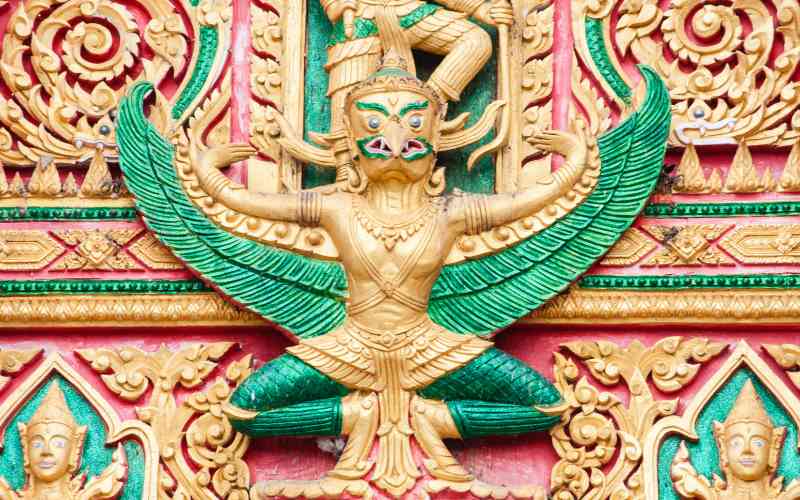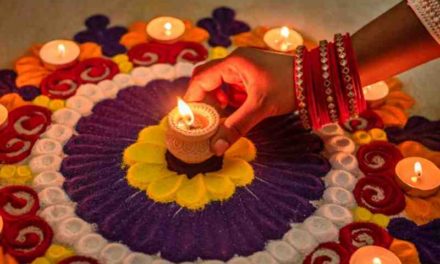The Garuda Purana is one of the 18 Mahapuranas, or ancient Hindu scriptures, that deal with various aspects of life, death, and beyond. It is a part of Vaishnavism literature corpus, primarily centering around Hindu god Vishnu (Wikipedia, n.d.). The text is composed in Sanskrit and is also available in various languages like Gujarati and English. The earliest version of the text may have been composed in the first millennium CE, but it was likely expanded and changed over a long period of time (Wikipedia, n.d.).
The Garuda Purana contains a conversation between Vishnu and his vehicle, Garuda, the king of birds, about death, the afterlife, sin, life in hell, the location of hell, Yama, the Lord of the Underworld, his assistant Chitragupta, a description of the City of Yama, the various kinds of punishments meted out to the sinners, how to avoid sin upon the earth, expiation of sin, what types of funeral rites should be performed for the departed and what happens when they are not performed and so on (Hindu Website, n.d.). The text also deals with the subject of liberation and how it can be attained through the practice of yoga and devotion (Vyasa Mahabharata, n.d.).
The Concept of Moksha and Liberation
Moksha is a Sanskrit word that means liberation or releases from the cycle of birth and death (samsara) that is caused by karma. Karma is the law of cause and effect that governs the actions and consequences of all living beings. According to Hinduism, every action has a corresponding reaction that affects one’s future life. The accumulated karma determines one’s destiny and quality of life. The only way to escape from this cycle is to achieve moksha, which is the ultimate goal of human existence.
Moksha can be attained by various means, such as knowledge (jnana), action (karma), devotion (bhakti), and yoga. However, different schools of Hindu philosophy have different views on how to achieve moksha and what it entails. Some schools consider moksha as a state of blissful union with Brahman, the supreme reality that pervades everything. Some schools consider moksha as a state of individual freedom and self-realization. Some schools consider moksha as a state of eternal service to Vishnu or other personal deities.
The Garuda Purana belongs to the Vaishnava tradition that worships Vishnu as the supreme lord and savior. According to this tradition, moksha can be achieved by surrendering oneself to Vishnu and following his commands. Vishnu is the preserver and protector of the universe who incarnates in various forms to restore dharma (righteousness) and destroy evil. He is also known as Hari, Narayana, Rama, Krishna, and other names. He is accompanied by his consort Lakshmi, who represents wealth and prosperity.
The Garuda Purana teaches that Vishnu grants moksha to those who are devoted to him and performs his worship with love and faith. It also teaches that Vishnu grants moksha to those who listen to or recite his glories and names. It also teaches that Vishnu grants moksha to those who serve his devotees and respect his temples. It also teaches that Vishnu grants moksha to those who follow his moral laws and perform their duties without attachment or desire.
The Benefits of Reading or Listening to the Garuda Purana
The Garuda Purana is not only a guide to achieving moksha and liberation but also a source of spiritual wisdom and inspiration. It contains many stories and legends that illustrate the power and grace of Vishnu and his incarnations. It also contains many teachings and instructions that help one to lead a righteous and virtuous life.
The Garuda Purana claims that reading or listening to it can bestow various benefits upon the reader or listener. Some of these benefits are:
- It can remove ignorance and impart knowledge.
- It can remove sins and purify the mind.
- It can remove fear and anxiety.
- It can remove diseases and promote health.
- It can remove poverty and grant wealth.
- It can remove obstacles and grant success.
- It can remove sorrow and grant happiness.
- It can remove bondage and grant liberation.
The Garuda Purana also claims that reading or listening to it can benefit the departed souls of one’s ancestors. It states that performing funeral rites for the deceased according to its prescriptions can help them to attain peace and salvation. It also states that offering food, water, clothes, money, or other gifts to the departed souls on certain days can appease them and earn their blessings.
Conclusion
The Garuda Purana is a valuable scripture that reveals the secrets of life after death and the way to achieve moksha and liberation. It is a part of Vaishnavism literature that glorifies Vishnu as the supreme lord who grants salvation to his devotees. It is also a source of moral guidance and spiritual inspiration for those who seek to live a righteous and virtuous life.
Reading or listening to the Garuda Purana can benefit both the living and the dead by removing ignorance, sin, fear, disease, poverty, sorrow, and bondage. It can also bestow knowledge, purity, courage, health, wealth, happiness, and liberation. Therefore, one should read or listen to the Garuda Purana with faith and devotion.
References
- Hindu Website (n.d.). The Garuda Purana – Complete Text. Retrieved from https://www.hinduwebsite.com/sacredscripts/puranas/gp/gp.asp
- Vyasa Mahabharata (n.d.). Garuda Purana – Vyasa Mahabharata. Retrieved from https://www.vyasaonline.com/garuda-purana/
- Wikipedia (n.d.). Garuda Purana – Wikipedia. Retrieved from https://en.wikipedia.org/wiki/Garuda_Purana





